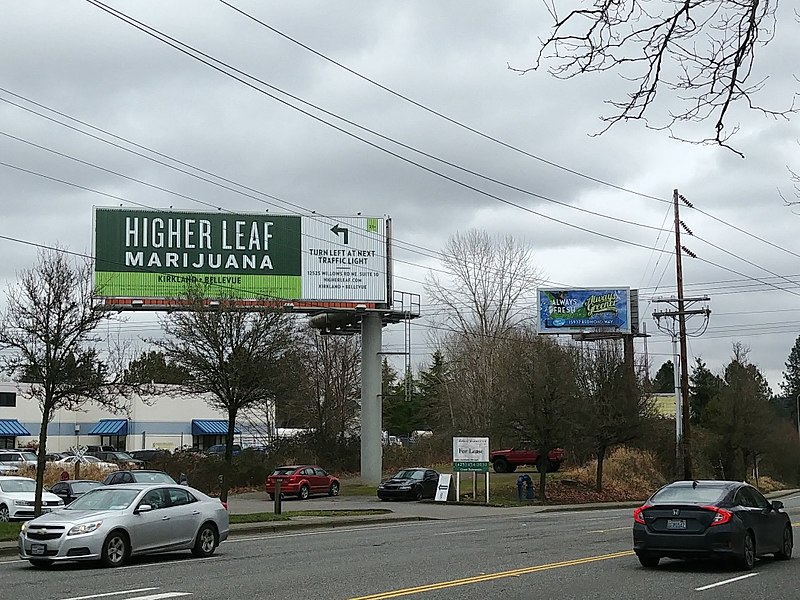Cannabis Prohibition is belatedly and gradually coming to a long-overdue death and legalized cannabis is now a reality across most of North America – at least with respect to medicinal cannabis. However, observers of the
illegal market for cannabis may find this difficult to believe.
In the U.S. state of Massachusetts, for example, an estimated 75% of the cannabis sold in 2019 will be (untaxed, unregulated) black market cannabis, according to
Forbes. And Massachusetts is one of a small minority of U.S. states that has already legalized both medicinal and recreational-use cannabis.
 (An employee of the MEDUSACO cannabis dispensary in Walsenburg, Colorado pointing to the dispensary's supply of flower product.)
(An employee of the MEDUSACO cannabis dispensary in Walsenburg, Colorado pointing to the dispensary's supply of flower product.)
In Canada, a
recent article from
Vice projects that “black market weed” could comprise 72% of recreational cannabis sales in Canada in 2019. This is despite the fact that recreational cannabis has been legalized at the national level in Canada – beginning in October 2018.
Why is illegal cannabis still claiming the vast majority of market share in North America, as governments in Canada and the U.S. profess their desire to put an end to black market cannabis commerce? The reasons are actually quite different on either side of the border but trace back to a common thread: government.
The same governments in Canada and the United States that criminalized cannabis use for a century without even the slightest legal or medical justification are now completely mismanaging the end of cannabis Prohibition.
In Canada, Prime Minister Justin Trudeau has basked in the glow of being a Western “leader” in the normalization of cannabis laws. But Trudeau’s Liberal government has tarnished any kudos he has earned through authorizing a new generation of anti-cannabis propaganda.
In one devious commercial that runs constantly on cable channels, a paid actor asks the question, “How can I use cannabis safely?” Really?
Cannabis is non-toxic and non-addictive.
Caffeine possesses more potential health risks than cannabis. When was the last time the government of Canada spent millions of tax dollars sponsoring any commercials about how to “drink coffee safely”?
In terms of the “supply bottleneck” that is causing Canadian cannabis consumers to continue to rely upon the black market for their supply of this legal commodity, the stupidity of provincial governments is largely to blame.
In British Columbia, for example, with only one fully-licensed retail outlet in the Province authorized to sell cannabis on October 17, 2018 (the day that recreational cannabis became legal), the RCMP immediately went on a city-wide blitz through Vancouver, shutting down most of the grey market cannabis dispensaries – who were operating with legal (local) business licenses but haven’t yet been able to obtain provincial licensing.
So in the Province’s ‘wisdom’, it was thought to be a better idea to shut down these locally licensed businesses and force British Columbia consumers to go to the black market to purchase this legal commodity. In recognition of this bureaucratic incompetence, Vice notes that analysts are slashing their forecasts for 2019 (legal) recreational sales by 30%.
In the United States, the thriving black market for cannabis (even in legal U.S. jurisdictions) is attributable to different factors. With anti-cannabis propaganda much more extreme in the U.S. and anti-cannabis hysteria more deeply-entrenched, the problem (even in legal jurisdictions) is primarily political intransigence.
While a particular state government may have legally authorized cannabis sales in that jurisdiction, local governments (still rife with anti-cannabis biases) block cannabis enterprises from getting their businesses off the ground. Exacerbating these dueling levels of government is political greed.
 (Back-to-back cannabis retail business billboards in Kirkland, Washington's Totem Lake commercial district.)
(Back-to-back cannabis retail business billboards in Kirkland, Washington's Totem Lake commercial district.)
One of the many reasons in favor of cannabis legalization is so that cash-starved governments can reap lucrative tax revenues from cannabis consumption. But sky-high licensing fees (for companies) in some U.S. jurisdictions, and sky-high consumption taxes in others are locking legal businesses out of this industry and continuing to push consumers into black market cannabis.
This is not like alcohol and tobacco consumption, where governments can justify extreme taxation levels as being necessary to offset some of the health costs due to the catastrophic health issues caused by tobacco and alcohol consumption. Cannabis
cures health problems rather than causing them.
North American governments were “good at” criminalizing cannabis: prosecuting
millions of cannabis users without any legitimate justification and tarnishing their lives with criminal convictions. These same governments have demonstrated far less competence and efficiency when it comes to undoing the legal travesty of cannabis Prohibition.
As Canadians and Americans deal with their governments discouraging the now-legal consumption of cannabis through new obstacles involving bureaucracy, stupidity, prejudice, and inefficiency, they continue to get the vast majority of their non-toxic/non-addictive cannabis from the same black market sources that have been supplying North Americans for decades.